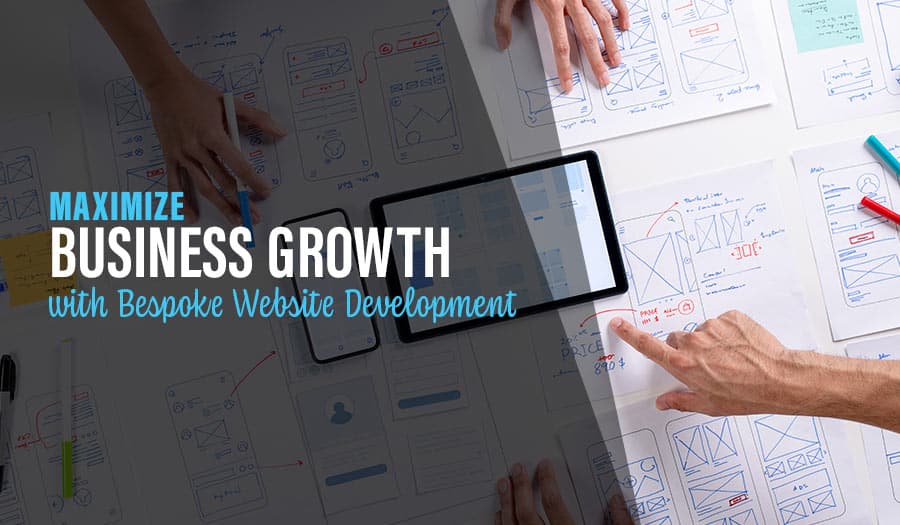There is really no such thing as a generic website that takes prospective customers from introduction to complete sale. There are many companies that promise easy website construction of a website, even using so-called artificial intelligence to make the website pop out fully-formed. However, without a real purpose and a basic business orientation, all you can expect from these easy processes is the equivalent of a classified ad. Here are the 3 most important things to consider when designing a website for your business.
3 Most important things to consider when designing a website
- Consider who you want to attract
- Consider what you want your website to do
- Consider what you want your website visitors to do
Designing a website is, in many ways, like designing your business itself. When planning a business, the first thing most new business owners do is writing a business plan. The plan describes your goals, includes core market research, and a detailed plan of action. Planning a website follows the same basic guideline.
The first step is to identify your intended audience and how you expect the audience will look at your website. Analyse your customers and clients. Who are they and how do you meet them? How do they interact with you. Is it an over-the-counter meeting, an office contact, online, telephone. What are your products? What would you like your products to be?
Focus on the majority of your customers who form the core of your business. Their tastes, interests, and paths of interaction with you will form the skeleton of your website. Do you want a website that will draw more customers to you or do you want just to inform you current customers.
3 Most important things to consider when designing a website
1. Consider who you want to attract
- Who do you want to attract to your website?
- Do you want to attract the press?
- Do you want to attract people in the community or do you aim for an online clientele?
- Do you expect visitors just from your local community or from a wide geographical area, across the country or around the world?
2. Consider what you want your website to do
Do you want to offer expertise and support?
- Do you want to answer the questions from existing customers and clients?
- Do you want a catalogue?
- Do you want a website for blogging and inbound marketing?
- Do you want a landing page which will answer objections and bring prospects into making buying decisions?
Internet-based marketing has become the primary channel for business to reach existing customers and potential customers, surpassing advertising. Often advertising is simply a way to present your website address. The message in your internet site can represent your store front or office and define the way your business looks and feels, especially if you market your products or services online.
3. Consider what you want your website visitors to do
When visitors land on your site, the site has to provide them with the tools to do what they want to do. A website that doesn’t have the buttons potential customers are looking for will fail and so will your marketing.
Website purposes fall into four basic categories.
1. Promotion
Where the website increases awareness of your organisation, company, or product by offering official information about them. Promotional sites build reputation and name recognition that will pay off in the future. Promotional websites are often called “brochure sites.”
These sites will often include blogs and general perspectives that give your name community credibility. Promotional sites are often part of an overall inbound marketing campaign. They are usually linked with a so-called “landing site” that includes the marketing tools.
2. Marketing
Marketing sites are designed to generate leads. They have a distinct focused marketing structure incorporating a series of “calls-to-action,” that solicit contact information or solicit commitments. Marketing sites are often used by “brick and mortar” businesses. They often offer promotions or free estimates I order to bring potential customers into the store.
Marketing sites are built on content that establishes credentials. The credentials are often presumed before visitors come to the marketing site.
3. Sales
Sales sites are focused on e-commerce. They often resemble catalogues that make it easy for customers to make choices among products and purchase online. They are usually illustrated with product photography with enough data about each product option to make customers feel secure about purchase.
4. Support
Support sites enhance after sales satisfaction. The sites contain updated and complete information about products and services you offer. They empower your customers to answer their own questions. Detailed operating instructions are always assuring to customers. In your support site you should always include easy contact information. Support sites are often linked to product-based special interest group (SIG) sites where customers can interact with others with the same product interests.
Further Reading: Built for Business: Amazing Wordpress Stats
Let’s chat about your website project. Please contact us for a quick consult about what you need and how we can help.
Let Pixel Fish take your business to the next level with a Stunning Business Website.
Check out some of our latest Website Design projects and Testimonials.
• Real Estate and Property Projects
• Not-For-Profit Projects
• Northern Beaches Projects
• IT and Technology Projects
• Medical and Health Projects
Further Information:
10 Tips for Creating a Better Contact Form to Improve Conversion
Tips For Creating A Website Sitemap For Your Business
10 Common Misconceptions About WordPress
Creating Website Content that Appeals to Both Scanners and Readers
Should I have Staff Photos on My Business Website?
How to Conduct an Effective Competitors Website Review
9 Ways to Optimise your Website for Voice Search
10 Ways To Improve Your Website Footer
8 Vital Signs That Your Business Website Needs Updating
8 Successful WordPress Website Design Best Practices
10 Best Practices for a Successful WordPress Website Design Project



